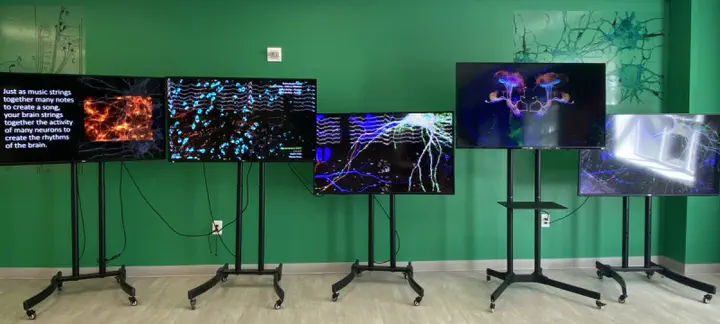'Step the Brain along a Path' Lobby Installation
 The lobby installation at Ferst Center for the Arts in September 2022
The lobby installation at Ferst Center for the Arts in September 2022My advisor, Chris Rozell, has dedicated significant time and effort to engaging the public with the changes and challenges posed by nascent neurotechnology. These efforts came to fruition in a collaboration with the Terminus Modern Ballet Theatre to create a ballet performance that explores the brain and the challenges of brain-computer interfaces. The piece was called Step the Brain Along a Path and was performed in the Ferst Center for the Arts at Georgia Tech in September 2022.
To enhance community engagement, I worked in a team with Abigail Paulson, Timothy Min, and Kimberly Binns to create a lobby art installation to accompany the performance. Our goal was to create an audiovisual presentation of data from the mouse hippocampus and those features relevant to everyday life and health. While Abigail provided data and Timothy composed the end music product, I created the visualizations and tried my hand at sonification—that is, the representation of data with sound. These audiovisual presentations were then incorporated into the larger installation (pictured above).
Sonification
I preprocessed the data to experiment with different signals that would be interesting to hear, for example:
- Spikes for each place cell, sorted by location. I mapped these to notes of different scales and arpeggios in the hopes of hearing replay events. The data was too messy (and came from an Alzheimer’s disease model mouse) to hear the replays clearly, but it was an interesting exercise.
- Sharp wave-ripple events
- Theta and gamma oscillations, both the band-limited power and filtered signals
We created different tracks to represent different states of the mouse, using high/low theta power to determine “active”/“restful” states and ripples to define a “recall” state.
Videos
Continuous recording, 0.32x speed
High theta power segments, 0.17x speed
Low theta power segments, 0.31 speed
Sharp wave-ripple segments, 0.25x speed
The audio and video of the spikes are a bit out of sync on this video, unfortunately.
